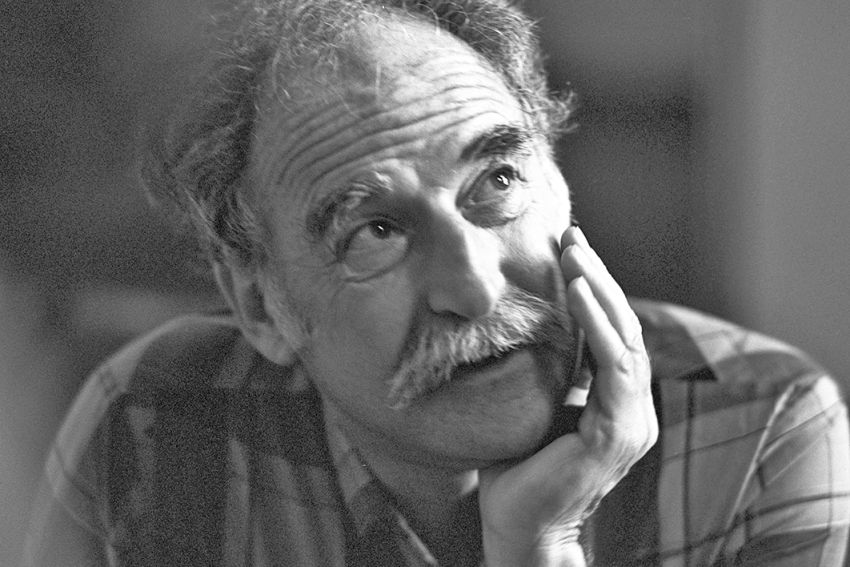
Walter Kaufmann was larger than life. A quintessential survivor, he survived the Nazis, transportation on the notorious Hired Military Transport (HMT) Dunera and incarceration in the refugee camp at Hay, New South Wales.
He then thrived here, establishing himself as a left-wing writer. He later returned to Germany and lived in the German Democratic Republic on the outskirts of Berlin, again establishing himself as a successful writer.
Born Jizchak Schmeidler to a Jewish mother in 1924, he was adopted at the age of three by a well-off, middle-class German couple, Sally and Johanna Kaufmann, and became Walter Kaufmann.
Also Jewish, they observed the Jewish High Holidays and Sally chaired the local Jewish congregation. However, like so many German Jews, they were largely assimilated. The rise of the Nazis was therefore a shock to the family.
With the Kristallnacht pogroms in November 1938, Sally was briefly imprisoned in Dachau concentration camp. The Kaufmann’s home was ransacked while Walter and his mother hid in the basement. As a result of the violence, Walter’s parents decided he needed to be sent to safety and, in January 1939, on his 15th birthday, Walter boarded a Kindertransport to England.
In June 1940, with Britain preparing for a German invasion, Walter was arrested, along with other “enemy aliens”. Together with 2000 other German and Austrian refugees, he was shipped on the infamous HMT Dunera and detained in the internment camp at Hay.
The presence of Nazi prisoners ensured the journey was no pleasure trip. The British military were also rough. Australian military records record Walter as an “Enemy Alien — Refugee from Nazi oppression”. Walter warmly recalled his dealings with the Australian soldiers who took them into internment.
Walter applied for his parents to enter Australia but by then they had been deported and were later killed in Auschwitz.
After his release from Hay in March 1942, Walter joined the Australian Defence Force. There he began writing. His short story won him the first of many literary prizes.
His first novel, Voices in the Storm, was published in 1953. It is a largely autobiographical account of the coming-of-age of a Jewish boy in Nazi Germany.
He also wrote of the Maralinga atomic tests and their impact on the local Indigenous people.
A member of the Communist Party of Australia (CPA), Walter was also a member of the Melbourne Realist Writers’ Group, and a friend of Frank Hardy and David Martin, who was also a Jewish refugee from Germany.
A member of the Seamen’s Union of Australia (SUA) and of the CPA, Walter earned his living in a wide variety of ways, including as a wedding photographer. In 1955, the SUA sent him to the 5th World Festival of Youth and Students in Warsaw. There he met other German Democratic Republic (GDR) writers and realised he could write professionally in the GDR, something which wasn’t possible for him in Australia. So, he and his wife moved to the GDR.
Though he had been a member of the CPA, he chose not to join the Socialist Unity Party of the GDR as this would have meant surrendering his Australian passport and the opportunities for international travel.
He travelled all over the world: the Americas, Western Europe and Asia. He became a well-known travel writer in the GDR. As a journalist, he reported on the Cuban Revolution and the trial of Angela Davis, among other important events.
He was always his own man and was never entirely trusted by the authorities, neither in Australia nor the GDR. Substantial files on him were gathered by the Australian Security Intelligence Organisation and the GDR’s State Security Service.
He continued to write short stories, novels and books for children. By the time the Berlin Wall came down in 1989, he had published 26 books in German. He was very much part of the GDR literary establishment.
With the demise of the GDR and his GDR publishers, Walter had to re-invent himself as a writer. He was one of the few writers from the GDR who was able to achieve some success in the capitalist world. He continued to write for two publications from the old communist regime, Neues Deutschland, formerly the Socialist Unity Party paper and Junge Welt, formerly published by the GDR’s official youth organisation.
A Jew in Nazi Germany, an enemy alien in war-time Britain, a communist in 1950s Australia, an Australian in Eastern Germany, a former citizen of the GDR in a re-unified Germany, Walter was an outsider.
But Walter was his own man, a survivor, “at home in homelessness”. He rejected any sense of victim-hood.
When I visited him in Berlin a couple of years ago, he told me he gave death little thought. He was fortunate enough to live in good health to the end. He died peacefully on April 15. He had a book review published in Junge Welt a month before.
Sadly, because of the COVID-19 pandemic, he did not live to see the documentary made about him Walter Kaufmann: Welch ein Leben! (Walter Kaufmann: What a Life!). Hopefully, we can all look forward to seeing this documentary of a remarkable life when we can next gather together at film festivals.
Vale, Walter!
[With acknowledgements to Klaus Neumann, whose substantial article on Walter Kaufmann, The Life of an Exile, was published on April 20 in Inside Story.]